Problem solving is something that Wavin has been doing for decades. Our innovations in technology are solutions to challenges faced by our customers, our communities and our municipalities. So, when we observed how frost damage...
News & Events
From the blog
Lorem ipsum dolor sit amet consectetur, adipisicing elit. Ipsa libero labore natus atque, ducimus sed.
Wavin BIM Revit video tutorial
Wavin Revit content is so accurate that it allows one-to-one transition from the 3D model to the real build. Our Revit packages have integrated intelligent assistance which allows Revit modelers to insert accurate bends which...
How it all began
18 April 2017
As a leading world supplier of plastic pipe systems and solutions, Wavin has built its reputation on high quality products and striking innovation. But how did it all begin? That question takes us back to...
Wavin celebrating its commitment to wastewater management
The lack of clean water and sanitation facilities is a major cause of disease for countries like Bhutan, a small land-locked nation in the Eastern Himalayas of Asia. In celebration of World Water Day 2017, Wavin shares the story...
Clean drinking water: birthright or luxury good?
Wavin cares deeply about the quality of our drinking water. After all, water is the most precious of all natural resources. But according to the World Health Organization, more than one billion people lack access to adequate...
The prevention of Legionella in high-risk water pipe systems
21 March 2017
When it comes to drinking water systems, hygiene is everything. Large plumbing systems, water heaters, hot tubs and especially our showers and faucets are all susceptible to potential life-threatening...
Wavin BIM Revit – from building design to construction
14 March 2017
In the realm of 3D, building information modelling (BIM) is the link that connects all the key players and stages of a building project’s lifecycle. Wavin understands the intricacies involved in such a...
Industry leaders unite to develop sustainable PlasticRoad prototype
The Netherlands is known for thinking "outside-of-the-box" when it comes to finding creative, sustainable solutions in road technology. In November 2014, the world's first solar bike path was created – a 70-meter stretch of...
History of plumbing, pipes, and plumbers: Medieval times
We have learned about ancient aqueducts and the plumbing proclivity of the engineers and plumbers of the Roman Empire. The job description is essentially the same today: assembling and installing pipes, maintaining water, sewage...
The Roman Empire: plumbing, pipes and plumbers
Wavin is looking at plumbing history, celebrating the science and art of the craft. This is part II.
A better way to send money
Lorem ipsum dolor sit amet consectetur adipisicing elit. Possimus magnam voluptatum cupiditate veritatis in, accusamus quisquam.
Transfer funds world-wide
Lorem ipsum dolor sit amet consectetur adipisicing elit. Pariatur minima sequi recusandae, porro maiores officia assumenda aliquam laborum ab aliquid veritatis impedit odit adipisci optio iste blanditiis facere. Totam, velit.
-
Competitive exchange rates
-
Lorem ipsum, dolor sit amet consectetur adipisicing elit. Maiores impedit perferendis suscipit eaque, iste dolor cupiditate blanditiis ratione.

Always in the loop
Lorem ipsum dolor sit amet consectetur adipisicing elit. Impedit ex obcaecati natus eligendi delectus, cum deleniti sunt in labore nihil quod quibusdam expedita nemo.
-
Mobile notifications
-
Lorem ipsum, dolor sit amet consectetur adipisicing elit. Maiores impedit perferendis suscipit eaque, iste dolor cupiditate blanditiis ratione.
-
Mobile notifications
-
Lorem ipsum, dolor sit amet consectetur adipisicing elit. Maiores impedit perferendis suscipit eaque, iste dolor cupiditate blanditiis ratione.

A less bumpy road with Wavin corrugated shaft pipes
Problem solving is something that Wavin has been doing for decades. Our innovations in technology are solutions to challenges faced by our customers, our communities and our municipalities. So, when we observed how frost damage from extreme winter weather caused pavements to swell and crack, sinking the manholes, we knew how to mitigate the problem.

Winter, the coldest of all seasons, is a beautiful time of year – a winter wonderland of snow and ice. But when everything melts, the frost and moisture damage to city streets is not very pretty. Asphalt pavements have a tendency to expand and contract with extreme weather. And so does the ground underneath. In extremely cold weather, when water gets into the ground beneath the pavement, it can freeze into ice which, in turn, will lift the road’s surface. When this happens, we begin to see potholes, pavement cracks and sewer manholes sinking below street level.
Although some of this asphalt erosion does, in fact, settle down after the thaw, most of it causes moderate-to-severe road damage. And this means costly repairs. The cost to repair damaged manholes and potholes can be quite steep. Municipalities bear the financial burden of road maintenance and repair, while the city dwellers must suffer the cost of damage to their cars (from street cracks and potholes) and the inconvenience of traffic congestion and delays (from road construction). Suddenly, the beauty of winter has turned into a beast… of road erosion and damage.
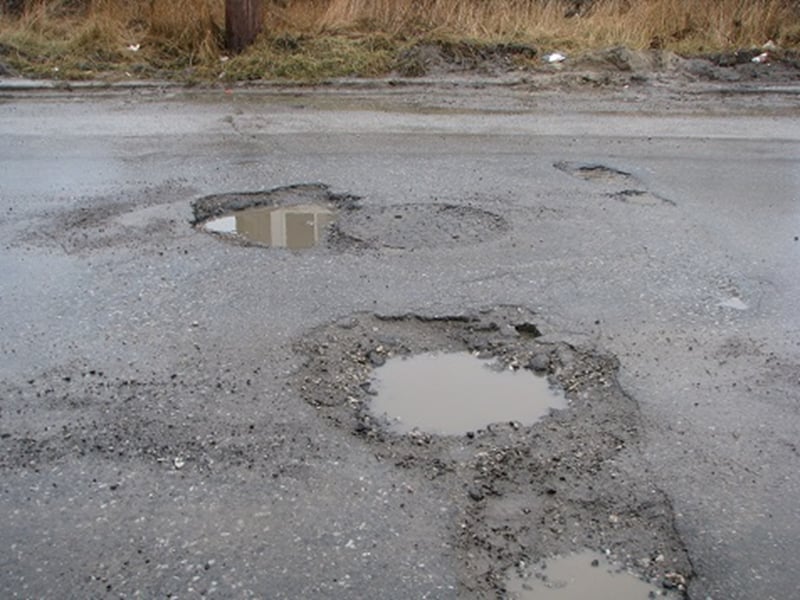
No more bumps in the road
As the saying goes, “The road to hell is paved with good intentions.” In this case, “hell” is a bumpy, crack-filled asphalt road. And, unfortunately, good intentions are not enough. But Wavin has figured out how to smooth away our winter woes. The corrugated shaft pipes that we use in our manholes and inspection chambers are structured so that the width, depth and angle of the pipe’s valleys (or notches) accommodate the soil conditions – allowing the soil to get in the free spaces at standard compaction conditions and with different backfill soils. It’s a very “contractor-friendly” structure: a correctly installed, durable inspection chamber – achieved in the quickest possible way! Here are some of the key advantages to using corrugated shaft pipes:
- They allow us to obtain a durable and indestructible riser/ground system
- They overcome the buoyancy of manhole/inspection chamber at high groundwater levels
- They provide wide support for side connections to the shaft, in the form of “in situ” fittings
- They respond flexibly to dynamic ground behaviour (i.e. its upheaval and settlement) and thereby provide a variable height for the manhole/inspection chamber, depending on
-ground settlement in an excavation over the period of its consolidation after work execution,
-periodic ground volume changes due to freezing and defrosting of ground water,
-and unexpected force distribution (eg. in mining operation areas).
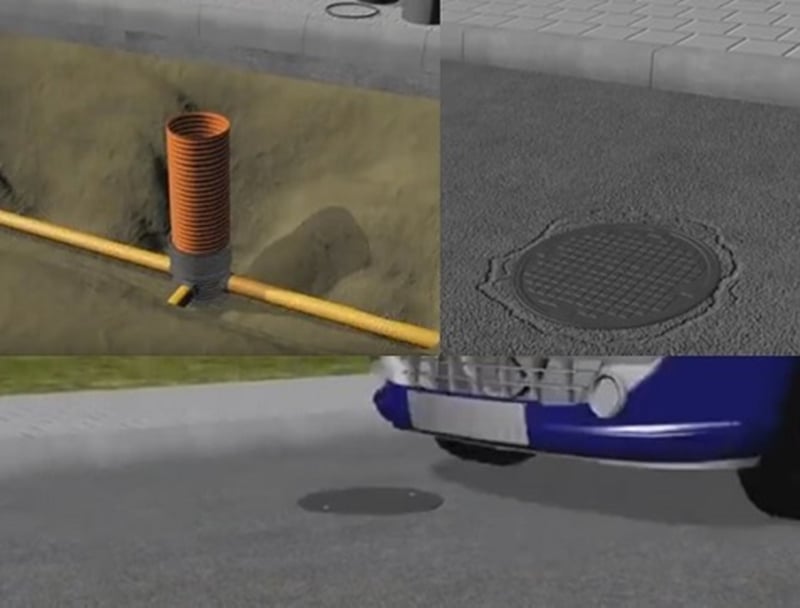
Breakthrough sewer technology
A corrugated shaft pipe is nothing without its “missing link” – the manhole and/or inspection chamber. Did you know that Wavin produced the World’s First industrial manufactured plastic manholes and chambers? Corrugated shaft pipes are utilised for both manholes, the systems used for real man-access (>800mm), as well as for our smaller inspection chambers (315-600mm). Since Wavin Tegra manholes are approximately 90% lighter than the cumbersome concrete manholes, they are much easier to handle and install. Additionally, a nearly step-less height adjustment can be made to the corrugated shaft pipe, to adapt either the manhole or inspection chamber to the required installation depth. The advanced design of the rib structure and shape of the Wavin Tegra’s cone gives the required strength and stability against heavy traffic load. Wavin's manholes and inspection chambers are a contractor’s dream: easy to install, easy to access, versatile and flexible. And above all – durable. An ideal solution for public sewer systems.
So when it comes to smoothing out the bumps in the road, our corrugated plastic shaft pipes, manholes and inspection chambers will withstand whatever weather challenge Mother Nature throws our way. And as for the municipalites and their citizens: the end of winter will no longer mean the beginning of the road construction season. It will simply mean the beginning of yet another beautiful season – Spring.
For more information on our piping systems and manholes/inspection chambers, please contact your local Wavin office.
Related content
Topics: SEA News
Wavin Revit content is so accurate that it allows one-to-one transition from the 3D model to the real build. Our Revit packages have integrated intelligent assistance which allows Revit modelers to insert accurate bends which can be ordered and installed as easy as generic Revit bends in your BIM model. This gives users the great advantage of being able to generate a very accurate BOM (bill of materials). And that’s just one of the many features of our Revit content packages. As an excellent example, check out how to insert and validate Wavin bends into Revit projects:
Insert actual bends in record time
Standard Revit piping functionality allow you to draw bends with almost any angle. Not so with Wavin’s Revit content packages. The integrated intelligent assistance provides impeccable checks and balances, so as to only allow you to draw the bends at angles that exist within the product portfolio used, thus preventing potential inaccuracies in the pipe design. And you don’t have to refer to a product catalogue. In this tutorial video, we show you how simple it is to change the type of bend, as well as how to reverse the direction of a bend. We demonstrate, for example, how a 90° bend can be quickly and accurately changed to an assembly of two 45° bends. We also show you how to validate your view, giving you the benefit of seeing the accurate installation model level of detail of your project. Now it’s your turn to try it out.
Download your Wavin Revit packages now
Related content
Topics: SEA News
18 April 2017
As a leading world supplier of plastic pipe systems and solutions, Wavin has built its reputation on high quality products and striking innovation. But how did it all begin? That question takes us back to the 1950s and a local water problem in Zwolle, The Netherlands.
There was a severe issue with their drinking water passing through old iron pipes that were corroding and leaking. J.C. Keller, a director of the district’s water utility decided to search for a solution.

It’s Hollywood movie material – in a small workshop the dedicated Mr. Keller worked ardently and successfully developed the first large diameter plastic pressure pipes suitable for potable water! It was revolutionary, and soon a wide demand for these pipes overwhelmed the small government-owned utility.
In August, 1955, WAVIN was established – joining WAter and VINyl for its name! Today Wavin is highly connected with commercial operations located in over 25 countries.
Now let’s go back to 1963 and check out this historical video (above) that shows the early tenacity of Wavin – including an amazing water pipe that is 1100m long (that’s over 3,600 feet). The historic film shows construction workers at the Wavin factory assembly site, large teams of men are helping to carry and stack huge PVC pipes, unwieldy and hard to handle. A helicopter is even utilized at one point for moving pipe.
This technology and materials were far ahead of its time nearly 60 years ago, and it was just the start. Creativity was the shape of things to come. Wavin continues its inspired process today, building an unrivalled reputation for continuous innovation, intelligent problem-solving, dedicated technical support and the highest standards. Always. That’s how Wavin is recognized and respected as a world leader of plastic pipe systems and solutions.
Topics: SEA News
Wavin celebrating its commitment to wastewater management
The lack of clean water and sanitation facilities is a major cause of disease for countries like Bhutan, a small land-locked nation in the Eastern Himalayas of Asia. In celebration of World Water Day 2017, Wavin shares the story of how expertise and innovation in wastewater management can help to transform vulnerable communities into healthy, vibrant and empowered villages – with access to clean and safe water, proper sanitation and hygiene.

World Water Day 2017 – Why wastewater?
Topics: SEA News
Wavin cares deeply about the quality of our drinking water. After all, water is the most precious of all natural resources. But according to the World Health Organization, more than one billion people lack access to adequate water. A community’s tap water is of paramount importance, and transportation and storage are major concerns too. That’s why Wavin is dedicated to water pipe systems that set the highest standards for safety and hygiene.
Some ask if using bottled water is the best option. Well tap water and bottled water are generally comparable in terms of safety according to the Mayo Clinic, and health expert Katherine Zeratsky, R.D., L.D. But it depends on the community, the pipes and the water treatment system.
The question of water safety is not a new phenomenon. The CDC tells us that the Duke of Württemberg, Germany warned against the use of lead in drinking water pipes in 1793, yet it was nearly a century later, in 1878, when lead pipes were outlawed due to concerns for the negative health effects. Today in the EU, water and sanitation are considered a basic human right and a public good, not a commodity. Protection of our precious water resources, both the water we drink and bathe in as well as fresh and salt water ecosystems, is the cornerstones of environmental protection in Europe. The stakes couldn’t be higher, and they transcend national boundaries.
Topics: SEA News
The prevention of Legionella in high-risk water pipe systems
21 March 2017
When it comes to drinking water systems, hygiene is everything. Large plumbing systems, water heaters, hot tubs and especially our showers and faucets are all susceptible to potential life-threatening contaminants like the Legionella bacteria. As a result, many preventative measures are taken like adding chlorides to the water or increasing hot water temperatures. But how will this affect your pipe system lifetime? Wavin joined forces with Canada’s JANA Labs to develop a software tool that assesses the life cycle of a piping system that is exposed to Legionella prevention measures. This tool is risk management at its best. In fact, it was precisely because of this software tool that Wavin won a piping system contract in Belgium – for the Queen Mathilde Mother and Child Centre of the University Hospital Antwerp.

Good hygiene, health and safety are of paramount importance to a hospital entrusted with the care of mothers and their children. And this is why the project leader for the new Queen Mathilde Mother and Child Centre in Belgium needed some guarantees that the piping solution they chose to have installed would be one that would be durable, sustainable and safe. For them, safety meant – among other things – Legionella prevention.
Legionella in a nutshell
Legionellosis is a respiratory disease caused by Legionella bacteria. It can potentially cause a serious and sometimes fatal strain of pneumonia (lung disease), called Legionnaires’ disease. It can also cause a less serious infection (with flu-like symptoms), called Pontiac fever. The bacterium is found in freshwater environments like lakes, streams and rivers and grows best in warm standing water. It becomes dangerous when it grows and multiplies in a building’s water system. People become susceptible to Legionnaires’ disease when they inhale small droplets of bacteria-ridden water in the air.

Legionella control plan
Amongst a growing number of EU countries, the prevention of legionella is mandatory for public spaces in Flanders/Belgium. On February 9, 2007, the Flemish government passed a law called the Legionella Decision. The decree lists all the preventative measures that need to be followed for water supplies, cooling towers, air conditioning systems with humidity treatment, other water and specific measures for exhibitions. These measures have been stipulated, based on the BBT (in English translation, this stands for Best Available Techniques) Report on Legionella control in new sanitation systems.
Apart from these government regulations, hospitals are amongst the high-risk buildings because their patients are highly susceptible to infectious diseases. Apart from following standard regulations to prevent legionella, hospitals need to have a legionella prevention control plan in place – which includes a program in which taking and evaluating a water sample is fundamental. The water management and legionella prevention plan must be in sync with the BBT – as to what the minimum and maximum temperature of the water pipes must be, the pipe system design (preventing dead ends), and disinfection (based on temperature, etc.) protocol. In the case of building expansion and renovation projects, chemical disinfection processes must be used.
One of the most important reasons for choosing Wavin materials was the warranty concerning the products’ lifespan – given by the JANA Labs calculation tool.Yves De Permentier , Imtech (the installer)
There is nothing better than a good tool
When Imtech, the installers for the Mother and Child Centre project, reviewed the report results that our JANA Labs tool generated and the level of detail that was provided on the product lifespan under very specific conditions, Wavin was chosen to provide the drinking water piping solution. The specific conditions that had to be met were twofold: first, the piping system should be able to withstand the temperatures and the chemical additives which would be used to disinfect the conduits, and second, they wanted a piping system with a long lifespan. And Wavin delivered. The 11,000 m2 Centre was fitted with the Wavin Tigris, Wavin PE and Wavin PP pipes and fittings.
Some Wavin words of wisdom
To anyone embarking on a piping project of this kind, we would recommend that they make sure that the pipe routing provides ample circulation to control water temperatures. And in the case of building expansion or renovation projects, chemical disinfection is often used and therefore our advice would be to think long-term and opt for a complete plastic pipe system.
One final word of advice: make sure that you have definitive proof of the expected lifespan of the materials you use. The ease of maintenance and high quality of plastic pipe solutions are setting the standard in the hot & cold drinking water and heating market.
Indeed, our JANA Labs tool is unique and the information it provides allows us to do a better job in providing our customers with solutions that not only mitigate the problem of Legionella, but also allows us to determine product lifespan in the context of pressure and temperature. In other words, it’s a game changer.
To see this pipe lifespan calculation tool in action, contact your local Wavin office.
Topics: SEA News
Wavin BIM Revit – from building design to construction
14 March 2017
In the realm of 3D, building information modelling (BIM) is the link that connects all the key players and stages of a building project’s lifecycle. Wavin understands the intricacies involved in such a collaboration of this magnitude. So we created a custom Revit content package that supports the industry by providing MEP BIM modellers with the ability to intuitively create a full and detailed plumbing system which is a 100% accurate installation model.

BIM is transforming the construction industry, as the number of projects being 3D modelled has increased exponentially and the need to save substantial costs by optimising designs at an early stage has become more of a priority. As industry innovators, Wavin has not only embraced BIM but has also developed custom BIM Revit content packages. With built-in intelligent assistance, these packages effectively eliminate any uncertainty in pipe design and makes specifying Wavin’s extensive range of above ground drainage products accurate, cost effective and efficient. And we did this because our priority is to support and assist MEP professionals, contractors and installers in their projects – from beginning to end.

Pre-design phase
The process of using BIM models collaboratively, from concept to installation and construction, is very lengthy. It begins with the architect preparing a schematic model and renderings, and then presenting them to the building owner (the client). Based on feedback from the client, tweaks will be made and then the model will be ready to move to the design phase of the project.

Design phase
During the design phase, the scheduling and estimating teams begin to get involved. The person responsible for scheduling must make sure that the building can be built in the time allocated for the project. Concurrently, the person in charge of estimating needs to continuously track the cost of the project. For this to happen seamlessly and without any mishaps, the BIM models need to be set up correctly from the get-go. At this stage, collaboration is key. Each team must know what the other is doing – the architects, engineers, project managers, estimator, scheduler, and construction manager. And BIM is the best way to manage this process.
Wavin has taken all of this into account. With Wavin’s Revit content packages, MEPs or Revit piping modellers will be able to produce precise designs easily – and without the use of product catalogues or any product knowledge. Thanks to the software's intelligent assistance, an accurate installation model can be made very quickly and easily so any potential problems like clashes (i.e. check whether the pipes will clash with the structure or other pipe systems), will be precisely detected. These can be corrected more easily and efficiently in the design phase before they become real problems – saving time and significantly minimizing the chance of failure. The content package will only allow designs to be created which can be delivered from the available product portfolio, providing confidence that what is designed is available and can be installed.

Construction phase
Once the design is complete, construction is ready to commence. BIM has created a tight connection between design and construction that never existed before. The ease with which project estimation and scheduling can be updated (as the project progresses) is simply unprecedented. We no longer need to ask the architects, engineers, operations and construction managers to collaborate efficiently. Instead, we look to how we can use BIM to make the whole process faster and more efficient.
So now there are efficiencies not only in the design phase, but also in the installation phase. When a design is complete, you immediately have a correct and complete material order. Previously, the planner had to extract information from the drawings and create the order himself, thus generating additional work and increasing the chance for human error. Now, however, everything is already automatically in the system.
Contractors and installers will enjoy the ease of use of Wavin’s predefined pipe and fitting schedules, which makes extracting the full and exact bill of materials a matter of a few mouse clicks. Furthermore, they benefit from having correct installation drawings, which in turn maximizes the reduction of failure (and the costs associated with it) during the installation process. Additionally, knowing the exact pipe length will make prefabrication of pipe parts possible, which further reduces the installation costs. And finally, an exact installation model will make it possible to order parts in phases without ordering the wrong products, too many or insufficient products.

Wavin BIM Revit – from start to finish
Just see for yourself
If you want to learn more about Wavin’s BIM Revit packages, go here.
How to download Wavin’s BIM Revit packages
We launched our BIM Revit content packages in May 2016 in multiple countries. The Wavin BIM Revit files are country-specific. If you have any questions or if your country is not mentioned, please connect to your local Wavin company or contact person.
Topics: SEA News
Industry leaders unite to develop sustainable PlasticRoad prototype
The Netherlands is known for thinking "outside-of-the-box" when it comes to finding creative, sustainable solutions in road technology. In November 2014, the world's first solar bike path was created – a 70-meter stretch of solar-powered road linking the Amsterdam suburbs of Krommenie and Wormerveer. And now three industry giants are joining forces to further develop the concept of a plastic road. The idea is to replace asphalt (traditionally used in road construction) with recycled plastic from the ocean.
The project is being spearheaded by VolkerWessels' enterprise, KWS, the largest road construction company in the Netherlands – in collaboration with Wavin, a world leader in plastic pipe systems, and oil and gas company Total. Together, we will combine knowledge, experience, and resources to build the first road made from 100% recycled plastic.
The birth of an idea
The PlasticRoad concept is the brainchild of KWS. The company took a look at the road-related problems that cities and urban areas face – such as the erosion of roads from weather and flooding, as well as the continuous need for maintenance and repair. These issues are costly and cause frustration, not to mention the potential safety issues due to potholes and road cracks. Another concern is that oil, the main component of asphalt, will become a scarce commodity in the not too distant future.
So, the idea of a road made... not from asphalt... but from 100% recycled plastic waste from the ocean begins to make sense. Concerns about noise reduction, water permeability and road flatness are effectively eliminated with the PlasticRoad concept. Additionally, switching from asphalt to plastic roads will likely reduce the carbon dioxide emissions significantly.
A collaborative effort to build a sustainable prototype
In order to take the idea to the next level, KWS decided to seek out partners who could contribute to developing a prototype. Wavin, with its knowledge base and expertise in recycled plastic pipe systems, is a natural choice as partner. Total rounds up the tri-company alliance. For all three, sustainability is at the heart of their corporate philosophy.
Topics: SEA News
History of plumbing, pipes, and plumbers: Medieval times
We have learned about ancient aqueducts and the plumbing proclivity of the engineers and plumbers of the Roman Empire. The job description is essentially the same today: assembling and installing pipes, maintaining water, sewage and drainage systems. Health, life and modern society depends on it.
Too much bathing was considered dangerous...
Topics: SEA News
Wavin is looking at plumbing history, celebrating the science and art of the craft. This is part II.
Topics: SEA News
A less bumpy road with Wavin corrugated shaft pipes
A less bumpy road with Wavin corrugated shaft pipesWavin BIM Revit video tutorial
Wavin BIM Revit video tutorial: “How to insert actual instead of generic bends in your BIM projects”How it all began
Wavin's journey into plumbing infrastructure began in the 1950s in Netherland. Read more about the progress of Wavin over the years to become a global entity.Wavin celebrating its commitment to wastewater management
Wavin celebrates its humanitarian commitment to wastewater management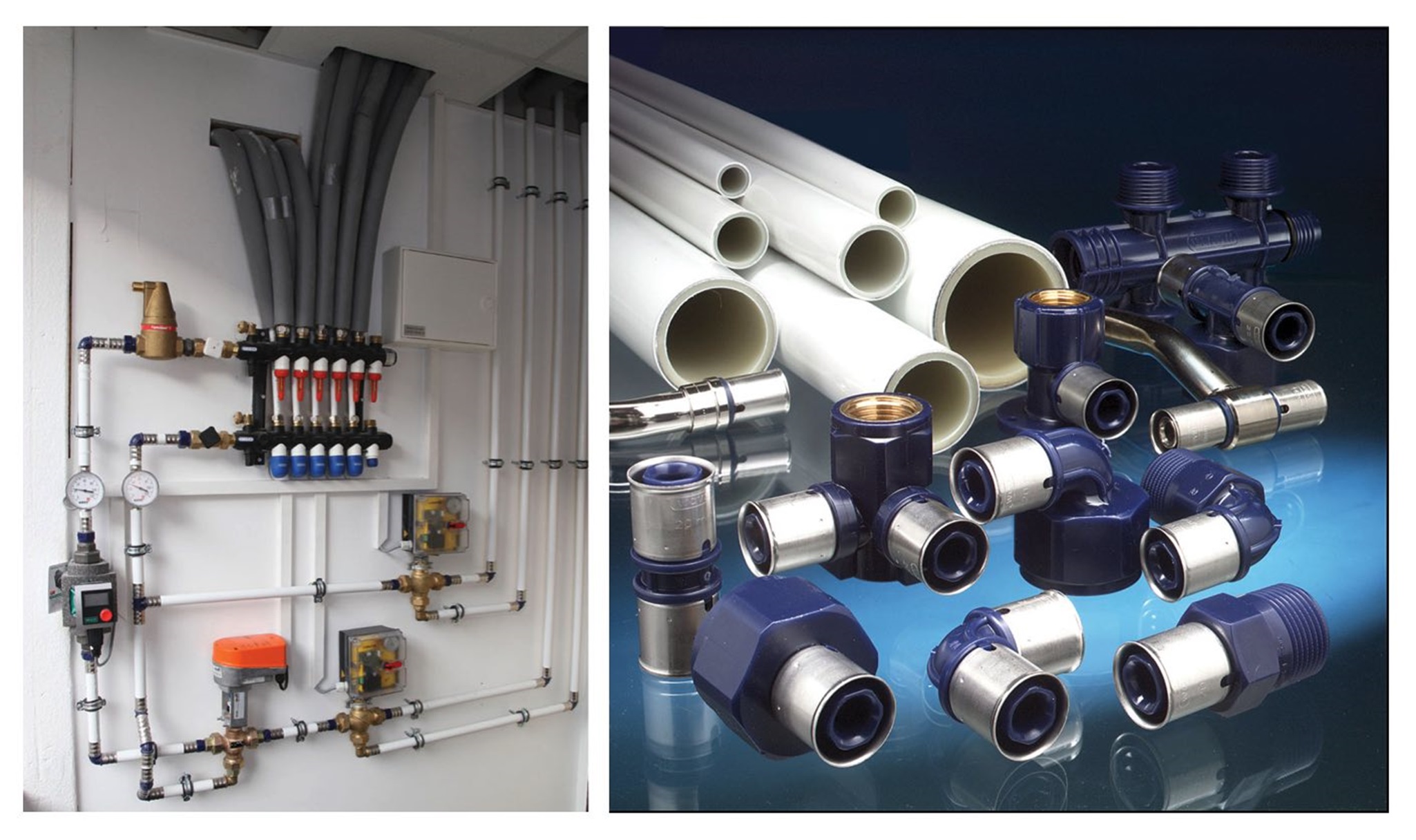
Clean drinking water: birthright or luxury good?
Clean drinking water: birthright or luxury good?The prevention of Legionella in high-risk water pipe systems
21 March 2017 When it comes to drinking water systems, hygiene is everything. Large plumbing systems, water heaters, hot tubs and especially our showers anWavin BIM Revit – from building design to construction
14 March 2017 In the realm of 3D, building information modelling (BIM) is the link that connects all the key players and stages of a building project’s lif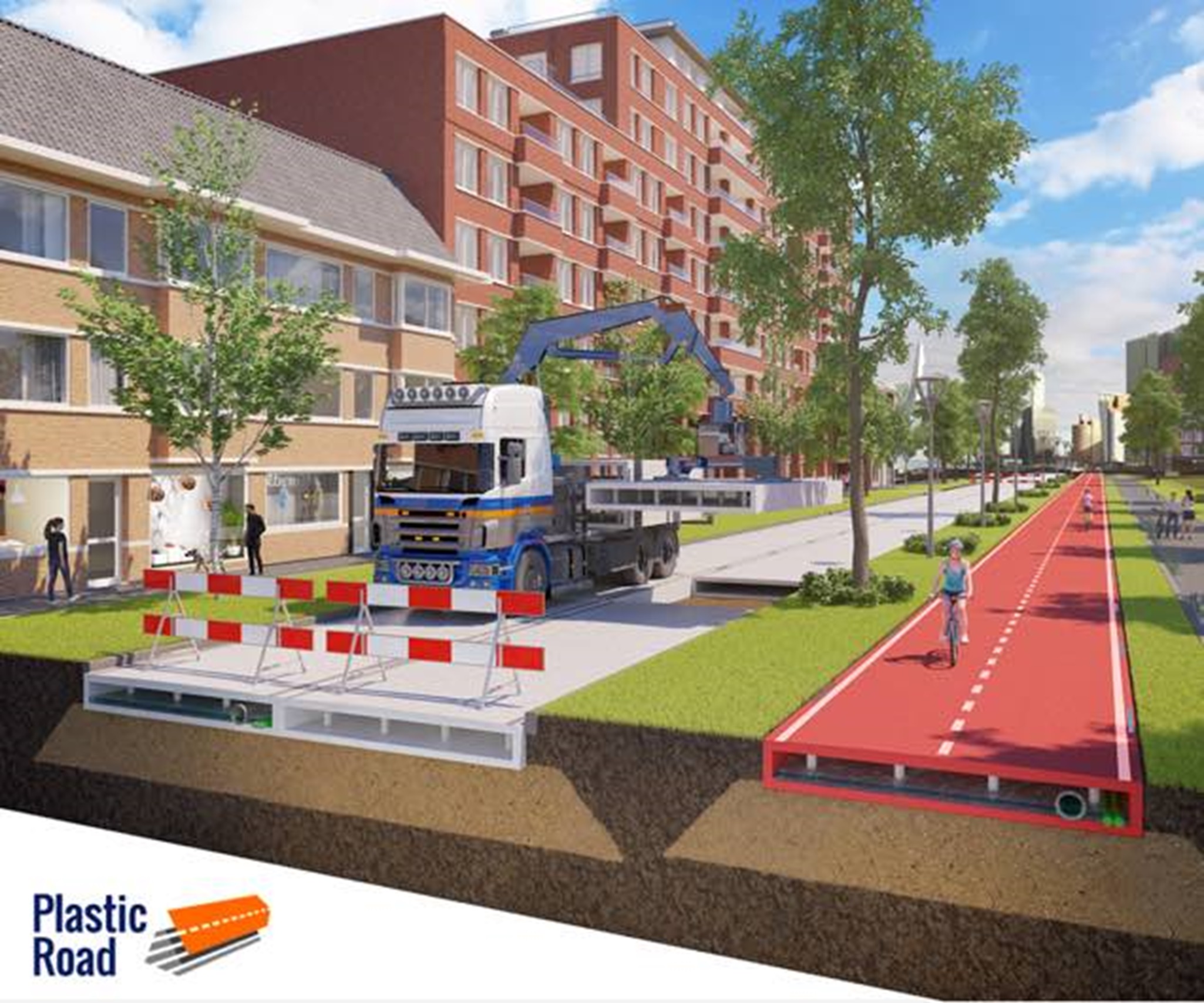
Industry leaders unite to develop sustainable PlasticRoad prototype
plastic road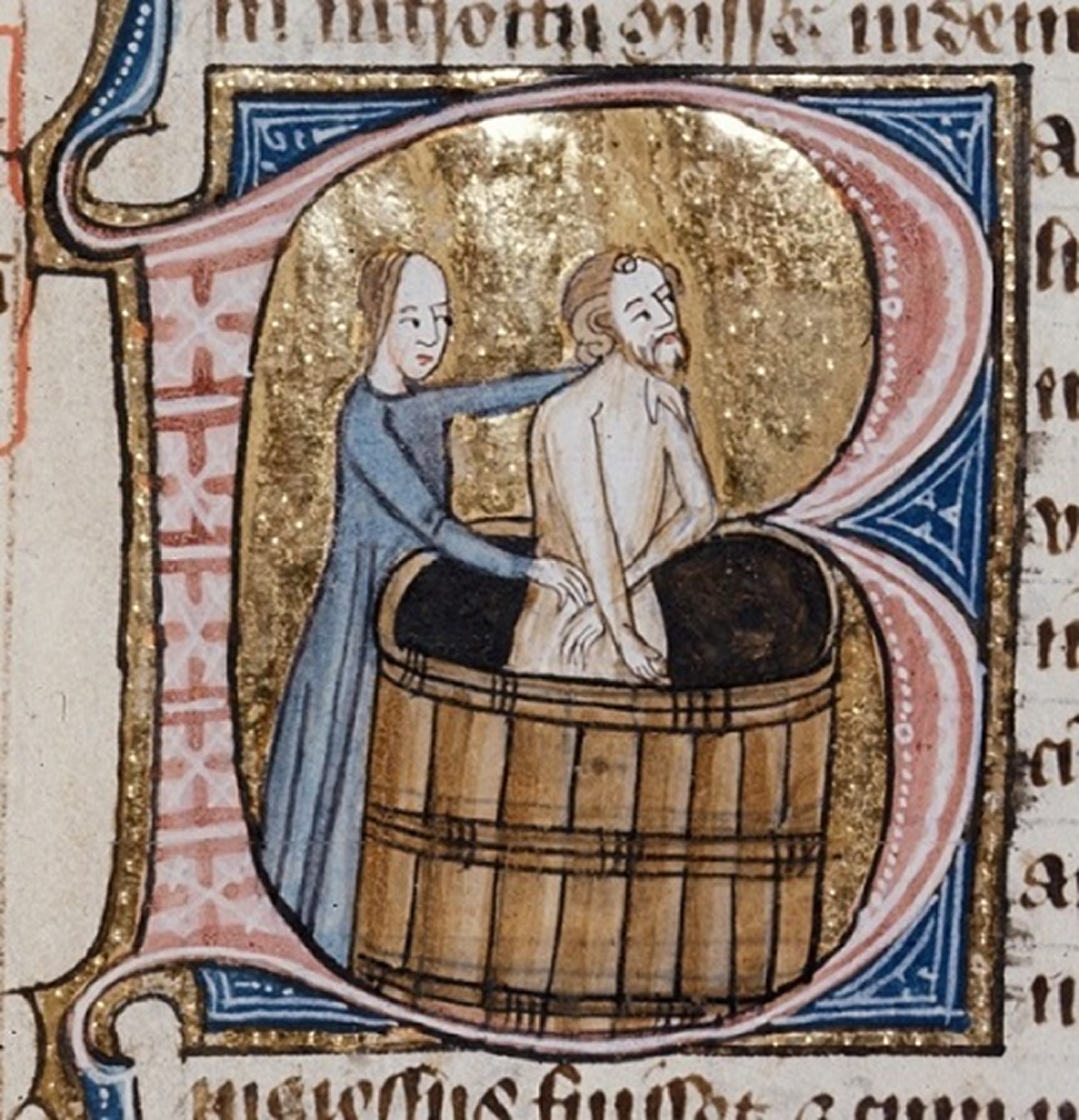
History of plumbing, pipes, and plumbers: Medieval times
History of plumbing, pipes, and plumbers: Medieval times (part III of a series)





